Sometimes a conductive hearing loss occurs in combination with a sensorineural hearing loss(SNHL). In other words, there may be damage in the outer or middle ear and in the inner ear(cochlea) or auditory nerve. When this occurs, the hearing loss is referred to as a mixed hearing loss.
Understanding Hearing: The Science of Sound and How It Impacts Your Life
What is Hearing?
How the Hearing Process Works
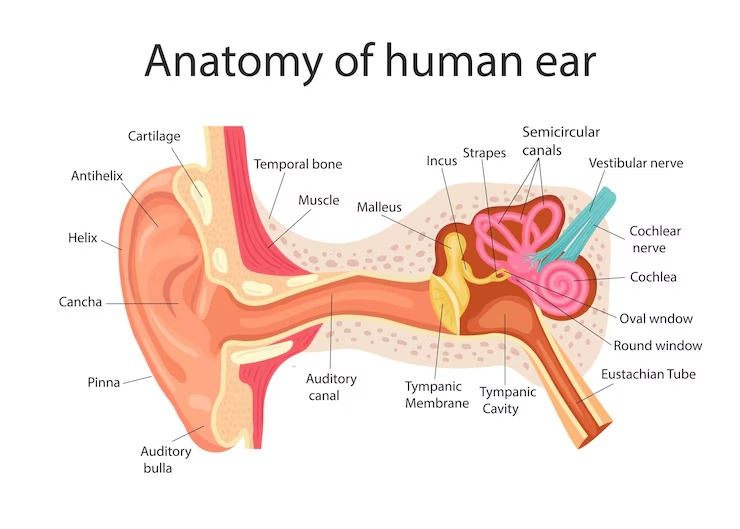
The Ear: Anatomy and Function
- The ear is divided into three main sections: the outer ear, middle ear, and inner ear.
- Outer Ear: Collects sound waves and directs them into the ear canal.
- Middle Ear: Amplifies sound and transfers vibrations to the inner ear.
- Inner Ear: Contains the cochlea, which converts sound vibrations into electrical signals sent to the brain.
- Outer Ear: Collects sound waves and directs them into the ear canal.
The Role of the Auditory Nerve
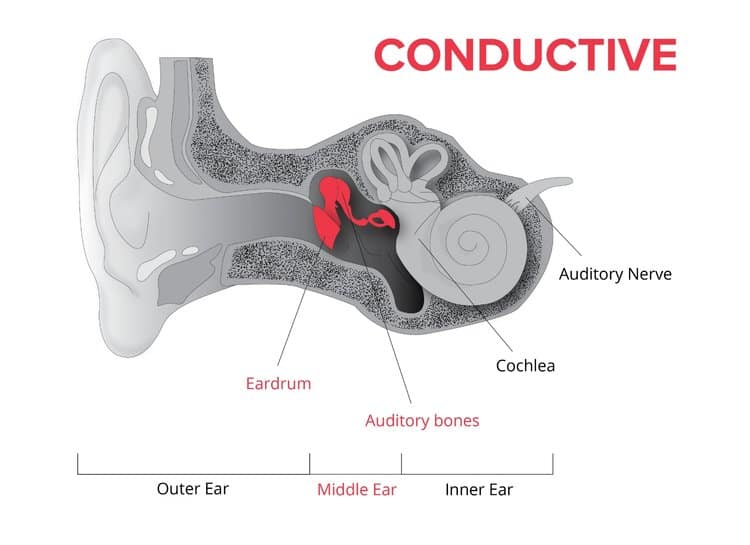
Conductive Hearing Loss
Conductive hearing loss occurs when sound is not conducted efficiently through the outer earcanal to the eardrum and the tiny bones (ossicles) of the middle ear. Conductive hearing loss usually involves a reduction in sound level or the ability to hear faint sounds. Modern techniques make it possible to cure or at least improve the vast majority of cases involving problems with the outer or middle ear. Even if people with conductive hearing loss are not improved medically or surgically, they stand to benefit greatly from a hearing aid, because what they need most is amplification.
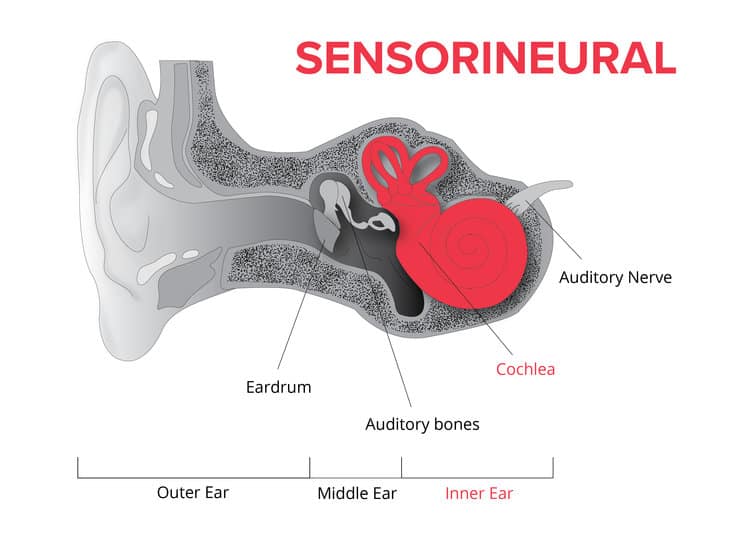
Sensorineural Hearing Loss
Sensorineural hearing loss (SNHL) occurs when there is damage to the inner ear (cochlea), or to the nerve pathways from the inner ear to the brain. Most of the time, SNHL cannot be medically or surgically corrected but stand to benefit greatly from a hearing aid. This is the most common type of permanent hearing loss.
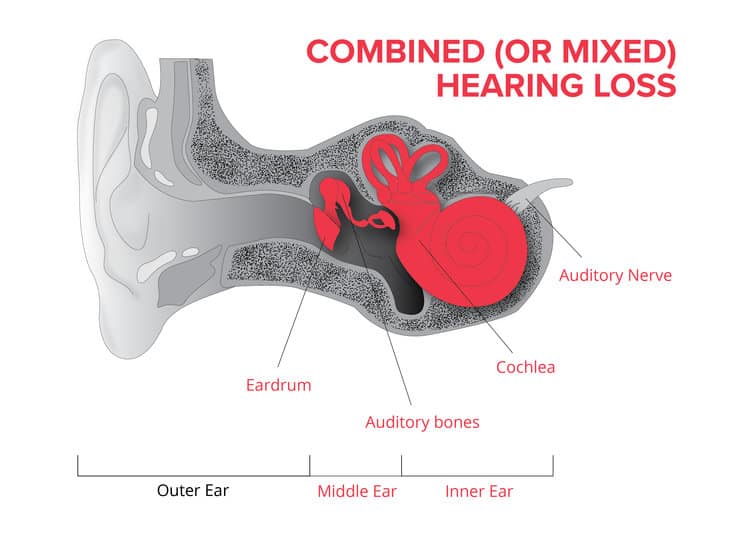
Mixed Hearing loss
Causes of Hearing Loss
Age-Related Hearing Loss (Presbycusis)
- A natural part of aging, presbycusis affects the ability to hear high-frequency sounds. It often develops gradually and can go unnoticed until it interferes with daily communication.
Noise-Induced Hearing Loss
- Caused by prolonged exposure to loud noises, which can damage the delicate structures of the inner ear. This is preventable by wearing ear protection in noisy environments.
Genetic Factors
- Inherited conditions can result in congenital hearing loss or progressive hearing loss over time.
Ear Infections and Injury
- Recurrent ear infections or physical trauma to the ear can lead to temporary or permanent hearing loss.
Medical Conditions and Medications
- Certain health conditions like diabetes, high blood pressure, and medications (such as ototoxic drugs) can contribute to hearing loss.
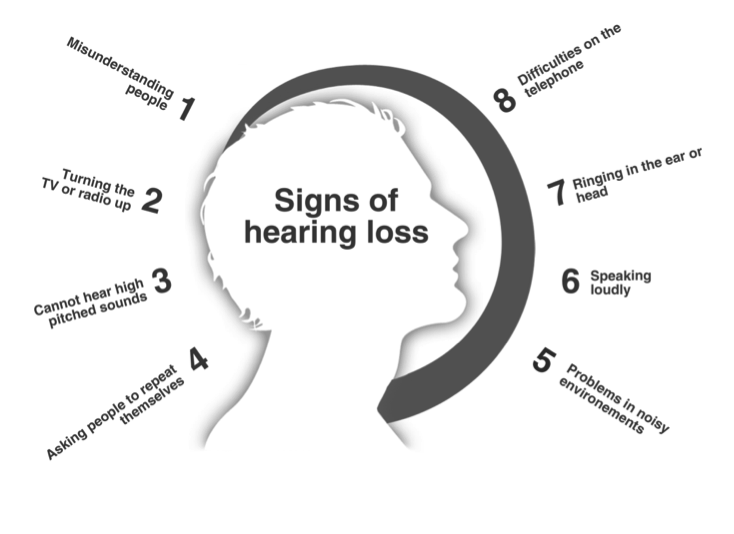
Symptoms of Hearing Loss
- Struggling to understand conversations, especially in noisy environments.
- Frequently asking others to repeat themselves or speak more slowly.
- Misunderstanding what others are saying.
- Sounds and speech may seem muffled or unclear.
- Difficulty hearing high-pitched sounds, like children's voices or birds chirping.
- Experiencing ringing, buzzing, or hissing sounds in one or both ears.
- Avoiding social situations because of difficulty hearing and understanding others.
- Feeling frustrated or embarrassed about not being able to follow conversations.
- Needing to turn up the volume on the TV, radio, or phone more than usual.
- Complaints from others that you are speaking too loudly.
- Missing everyday sounds like doorbells, alarms, or the phone ringing.
- Struggling to hear clearly on the phone.
- Feeling tired or stressed after trying to listen or participate in conversations.
People who have hearing loss are sometimes not aware of it. Hearing loss usually develops gradually – so gradually that you don’t notice the loss of these subtle everyday sounds. Before you know it, you could start missing the important sounds in your everyday life, such as the voices of loved ones.
Evaluate your hearing by taking a hearing loss self-test.
Common Symptoms
- Difficulty understanding conversations, especially in noisy environments
- Frequently asking people to repeat themselves
- Ringing in the ears (tinnitus)
- Turning the volume on devices (TV, radio) higher than usual
- Feeling like others are mumbling or not speaking clearly
When to Seek Professional Help
- If you or a loved one notices any of these signs, it’s crucial to seek an audiologist’s evaluation. Early intervention can make a significant difference in managing hearing loss.

Benefits of Early Detection of Hearing Loss
Hearing aids can significantly improve the user’s communication and can return the hearing impaired to a full and active lifestyle. With hearing aids most people can hear their family and friends more easily and enjoy being in group conversations without asking people to repeat themselves all the time. They can watch TV at a normal volume, hear the warning signals and hear more easily in phone conversations.
Hearing aids improves the quality of life in most cases and reduces the negative impact of hearing loss. On the other hand, the quality of life suffers when hearing impairment is left untreated.
An American study found that people with hearing problems who did not wear hearing aids were more likely to report sadness and depression, anxiety, paranoia, emotional problems, insecurity and reduced social activities. This study also found that people who started wearing hearing aids reported significant improvements in their quality of life.
Health Tips & Info
Those whose hearing loss was treated by hearing aids reported the following benefits:
- Improved relationships with their families
- Greater independence and security
- Better self-esteem / self-confidence
- Improved mental health
- Reducing the risk of auditory deprivation
Another benefit of wearing hearing aids is preserving the quality of your hearing and reducing the risk of auditory deprivation. As a result of a continued lack of sound stimulation, auditory deprivation, the brain gradually loses some of its ability to process information including speech.Auditory deprivation most often occurs when the ear goes unaided over a long period of time – so the earlier you consider wearing hearing aids, the better your chances are of minimizing this risk. So, the idea of “use it or lose it” truly does apply to hearing.
Departments
- General improvement in their quality of life
- Improved relationships with their families
- Greater independence and security
- Better self-esteem / self-confidence
- Improved mental health
- Reducing the risk of auditory deprivation
Contact Us
- +91 93245 98192
- info@aurahearingaid.com
How Hearing Tests Work
- Hearing tests assess your ability to detect different sounds at varying frequencies and volumes. These tests help determine the type and degree of hearing loss, if any, and the appropriate treatment options.
Benefits of Early Detection
- Identifying hearing loss early can help prevent further deterioration, improve speech and language development in children, and enhance communication skills for adults.
How Often Should You Get a Hearing Test?
- It’s recommended to have a hearing test every 1-2 years, especially after the age of 60 or if you have been exposed to high levels of noise.
Why Choose Aura Hearing Aid for Your Hearing Needs?
- Expertise: Our team of experienced audiologists and hearing care professionals is dedicated to helping you find the right solution for your hearing loss.
- Top-quality Products: We offer the latest hearing aid technology, designed for comfort, style, and performance.
- Comprehensive Support: From consultation to fitting and ongoing support, Aura Hearing Aid is with you every step of the way.
- Customer-Centric Approach: We understand that every hearing loss situation is unique, and we provide personalized care tailored to your specific needs.

Contact Us
aura.wecare@gmail.com
+91 93244 54132
Frequently Asked Questions (FAQ)
What are the different types of hearing loss?
Answer: Hearing loss can be categorized into three main types:
- Conductive Hearing Loss: This type occurs when there is a blockage or damage to the outer or middle ear, which prevents sound from reaching the inner ear. It can often be treated with medical or surgical interventions.
- Sensorineural Hearing Loss: This results from damage to the inner ear (cochlea) or the auditory nerve. It is usually permanent and can be managed with hearing aids or cochlear implants.
- Mixed Hearing Loss: A combination of conductive and sensorineural hearing loss, which may require a combination of treatments to manage.
Can hearing loss be reversed?
Answer: Currently, sensorineural hearing loss, caused by damage to the inner ear or auditory nerve, cannot be reversed. However, it can be managed effectively with hearing aids, cochlear implants, and assistive listening devices. Conductive hearing loss, on the other hand, is often treatable through medical or surgical interventions.
How can I tell if I have hearing loss?
Answer: Some common signs of hearing loss include:
- Difficulty understanding conversations, especially in noisy environments
- Frequently asking others to repeat themselves
- A feeling of ear fullness or muffled sounds
- Increased volume of electronic devices, like the TV or radio
- Ringing in the ears (tinnitus)
If you notice any of these symptoms, it’s recommended to get a hearing test from a professional audiologist.
At what age should I start getting regular hearing tests?
Answer: It’s advisable to start regular hearing tests at the age of 60. However, if you have been exposed to loud noises, have a family history of hearing loss, or experience any of the signs mentioned above, you should schedule a hearing test earlier. For children, early screenings are essential to ensure proper hearing development.
How do hearing aids work?
Answer: Hearing aids amplify sound to compensate for hearing loss. The device captures sound through a microphone, amplifies it, and sends it to the ear. The processed sound is then transmitted to the ear canal, making it easier for the wearer to hear. Different models offer features such as noise reduction, speech enhancement, and connectivity with smartphones for added convenience.
Will hearing aids work for me if I have severe hearing loss?
Answer: Many health insurance plans offer partial or full coverage for hearing aids. However, coverage varies depending on your provider and plan. It’s best to check with your insurance company or consult your audiologist for information on coverage options and available financing plans.
Can hearing aids be used for both ears?
Answer: Yes, hearing aids can be used for both ears. In fact, using hearing aids in both ears, known as binaural hearing aids, is generally recommended as it helps with sound localization, better speech understanding, and improved overall hearing experience.
How long do hearing aids last?
Answer: On average, hearing aids last between 3 to 7 years, depending on the model, usage, and care. Regular maintenance, such as cleaning and battery replacement, can help extend the life of the device.
Can hearing aids help with tinnitus?
Answer: Yes, hearing aids can help with tinnitus. Many hearing aids have a tinnitus masking feature that produces a soft sound to help distract from the ringing or buzzing in the ears. This feature can provide relief for many people suffering from tinnitus.
How do I choose the right hearing aid for my needs?
Answer: Choosing the right hearing aid depends on several factors, including:
- The type and degree of hearing loss
- Your lifestyle and preferences (e.g., whether you need a discreet device or one with advanced features like Bluetooth connectivity)
- Your budget
- Comfort and fit Consulting an audiologist will help you find the most suitable hearing aid based on your specific needs.
Can I adjust the volume on hearing aids?
Answer: Yes, most modern hearing aids allow users to adjust the volume to suit their needs. Some models also come with automatic volume control, which adjusts the volume based on the surrounding noise levels. Many hearing aids can be connected to smartphones or remote controls for easier adjustments.
Are there any risks associated with wearing hearing aids?
Answer: Hearing aids are generally safe to use and do not pose significant risks. However, improper use or poor maintenance (e.g., not cleaning the device regularly) can cause discomfort or lead to infections in the ear. It’s essential to follow the instructions provided by your audiologist and regularly clean your hearing aids for optimal performance.
How do I maintain my hearing aids?
Answer: To maintain your hearing aids:
- Regularly clean them using the tools provided by your audiologist.
- Replace the batteries as needed, or charge them if they are rechargeable.
- Store them in a dry, clean case when not in use.
- Avoid exposing them to excessive moisture or heat.
Schedule periodic check-ups with your audiologist to ensure they are working correctly.
